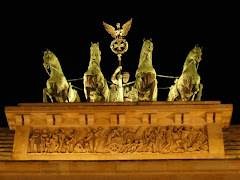Monday, December 29, 2014
Wednesday, October 1, 2014
Jack Ma
East is East and West is West, and never the twain shall meet."More than 100 years ago, Rudyard Kipling wrote those words before the world had shrunk back into a new Pangaea, reconnected by fiber-optic lines, global-supply chain networks and global brands.
--Rudyard Kipling
Alibaba and its kinetic leader Jack Ma have blended the best of Western and Chinese technologies, culture and management to create the world’s largest ecommerce company and perhaps soon to be biggest and most diversified global technology enterprise. The company’s Sept. 19 IPO raised more than $20 billion and gave Alibaba a market cap of $240 billion. It also made Jack Ma, already the richest man in China, one of the most wealthy men in the world with a net worth of more than $18 billion.
Alibaba is not just an ecommerce company. While its three main platforms Taobao (a consumer-to-consumer company) Tmall (a business-to-consumer firm) and Alibaba.com (a business-to-business operation) generated more than $250 billion in transactions and $7.9 billion in revenue in 2013 in China, the company also has interests in electronic payments, cloud computing, streaming entertainment, supply-chain infrastructure and investment funds. It is poised to expand its technology interests and platforms on a global basis.
So how did a former English teacher from Hangzhou, known as “Crazy Ma” because of his unorthodox management philosophy, build one of the most valuable companies in the world in just 15 years? He did it by blending the best of Western and Eastern technologies, operational practices and management styles.
The following are four elements of Ma’s management style that entrepreneurs and small-business owners can follow to build the next Alibaba.
Related: How Alibaba's Jack Ma Became the Richest Man in China
1. Be like Forrest Gump.
Jack Ma relates to the naive innocence with which the character Forrrest Gump approaches life. Ma watches his favorite film Forrest Gump over and over and over again. Indeed Ma never let himself get down, even when he made $15 a month as a teacher while supplementing his income peddling on the street.Nor did he become discouraged when KFC, a hotel and the police turned him down for jobs. He kept on believing that if someone sticks to his principles and works hard, anything was possible. Like Forest Gump, Ma has always seen the world and its possibilities almost as if through the eyes of a child, believing technology could be magic and life truly a box of chocolates -- but one that a person never knows what he will get inside.
Successful entrepreneurs do not let setbacks get them down and they see both what's impossible and possible, but the difference is that they focus only on the possible.
Related: Is Competition a Catalyst for Innovation?
2. Innovate on the shoulders of giants.
Ma has consistently understood that innovation is not always synonymous with invention. Like Steve Jobs, who did not invent the digital music player, and Bill Gates, who did not invent computer operation systems, Ma built his most successful properties on the foundations of what came before. For example eBay had long been established as the largest and most successful consumer-to-consumer ecommerce site in the world when Ma launched Taobao.What Ma did was adapt the concept specifically for China, knowing that culture, history, philosophy and mind-set were as important to success as functionality. That is why he included a real-time chat function on Taobao, so that buyers and sellers could build a relationship and trust and negotiate in real time. In China every transaction is personal.
To be like Jack Ma, entrepreneurs should believe that pure invention is not necessary to be an innovator.
3. Soar with eagles.
Jack Ma has surrounded himself with the smartest and most capable and innovative executives and managers he could find. He never believed that he was an expert at everything and that as a founder he had earned the right to micromanage every aspect of his business. At a time when it was very unusual, Ma was open to bringing in foreign executives to further his goal of blending East and West.He also befriended Jerry Yang, co-founder of Yahoo, and Masayoshi Son, chairman of Japanese telecom giant Softbank. Both were early investors in Alibaba and helped the company grow more quickly. Yahoo and Softbank were repaid handsomely on IPO day.
Entrepreneurs need to let others have control and should do what is right for their business not their ego.
4. Take your business but not yourself seriously.
Ma has worked hard from Day 1 to build a unique culture at Alibaba. Yes that sounds like a cliché and old-fashioned management-speak, but it has proved to be one of the most important factors in Alibaba’s success.Ma has built a culture of participation, inclusion and fun. He exhibits high energy and is outspoken, fun loving and charming. He has ensured that all those personal traits have become company traits and is well known for singing karaoke with employees, holding company retreats for 15,000 (focused on fun not work) and dressing in outlandish outfits when addressing management.
He has created an atmosphere such that Alibaba employees treat him like a combination of father figure, inspirational guru and band leader. The result is a super loyal, hardworking group of executives, managers and employees who would follow Ma to the ends of the Earth.
It's of paramount importance that entrepreneurs build a brand and culture simultaneously and not take themselves too seriously.
None of this was an accident. Ma spent years studying Western culture, management concepts and successful businesses, took what he needed and left the rest. He combined that with his love and understanding of China's culture and consumption habits to create an all-encompassing technology success that is positioned to become the first truly global Chinese brand.
Ma has proved through his unique management style for Alibaba that East and West can meet and when they do something beautiful can come of it.
Related: Who Knew? Charismatic Alibaba Founder Jack Ma Moonlights as a Singer (Video)
Friday, September 5, 2014
Mark Cuban
Billionaire investor and sports magnate Mark Cuban put his mouth where his money is.
Cuban included a company from his hometown of Pittsburgh as he introduced products from a quartet of startups he’s staked at the Dallas-Fort Worth Central Markets in Dallas, Fort Worth and Southlake. The Dallas Business Journal, a sister publication, reported that Cuban met with shoppers in all three Texas locations to talk about products from Simple Sugars of Pittsburgh, among others. Cuban invested $100,000 in entrepreneur Lani Lazzari’s Simple Sugars on the ABC-TV show Shark Tank last year for a 33 percent stake in the then-teenager's company. Fox Chapel native Lazzari started developing Simple Sugars, a line of all-natural body scrubs, at age 11 in 2005.
The other companies were Monkey Mat, based in Austin, Tex.; Chapul, based in Salt Lake City, Utah; and Alyssa’s Bakery, based in Jupiter, Fla.
The products are part of a line of consumer items Cuban is backing, the Dallas Business Journal said, and on Sept. 28, he’ll help to launch a collection of products at Target stores.
Cuban included a company from his hometown of Pittsburgh as he introduced products from a quartet of startups he’s staked at the Dallas-Fort Worth Central Markets in Dallas, Fort Worth and Southlake. The Dallas Business Journal, a sister publication, reported that Cuban met with shoppers in all three Texas locations to talk about products from Simple Sugars of Pittsburgh, among others. Cuban invested $100,000 in entrepreneur Lani Lazzari’s Simple Sugars on the ABC-TV show Shark Tank last year for a 33 percent stake in the then-teenager's company. Fox Chapel native Lazzari started developing Simple Sugars, a line of all-natural body scrubs, at age 11 in 2005.
The other companies were Monkey Mat, based in Austin, Tex.; Chapul, based in Salt Lake City, Utah; and Alyssa’s Bakery, based in Jupiter, Fla.
The products are part of a line of consumer items Cuban is backing, the Dallas Business Journal said, and on Sept. 28, he’ll help to launch a collection of products at Target stores.
Monday, February 3, 2014
Tuesday, January 7, 2014
Subscribe to:
Posts (Atom)












